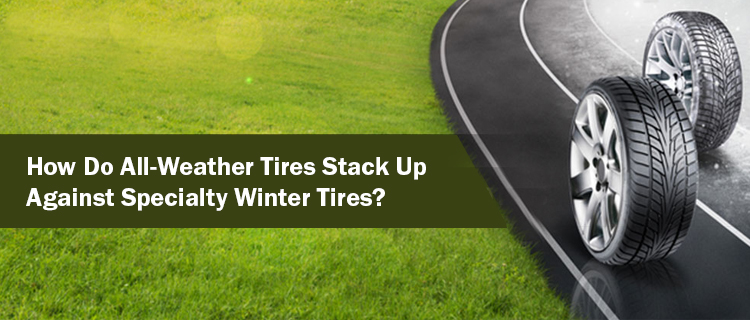How Do All-Weather Tires Stack Up Against Specialty Winter Tires?
March 6, 2021
Tires

Today’s post discusses two alternatives to winter tires, with a focus on how all-weather tires stack up against specialty snow tires. Read on or contact your local TIRECRAFT to compare specific all-weather and winter tire products.
Winter Tire Alternatives: All-Weather Tires Versus Studded Tires
While snow tires work best in extreme cold conditions, they’re not the only option for drivers looking to stay safe through the winter months.
For drivers in Northern Ontario, studs offer one way to add grip on the roads, with studded all-season tires providing “similar stopping distances as winter tires in most conditions,” according to the Government of Ontario website.
However, studded tires, even those quieter modern varieties seen on the Nokian Hakkapeliitta 8, just aren’t for everyone. They’re less effective on bare pavement, and they’re banned outright in Southern Ontario.
So what does that leave us?
Enter the all-weather tire, Canada’s true all-season option, which strikes a unique balance between any-weather versatility and rugged winter performance. And that balance is key, as there’s “no free lunch when it comes to tires,” says Greg Cressman, Technical Services Director for Yokohama Tire Canada. “Tires have so many jobs and responsibilities that there’s always a balancing act and need for compromise.”
In other words, there’s a tradeoff, with all-weather tires having to sacrifice some degree of winter handling for the sake of all-season performance. But exactly how much winter performance are we giving up? And is the money we save on tire storage and seasonal changeover worth it?
The answers to these questions will change based on the tire, but you can always contact your local TIRECRAFT to compare specific winter tire and all-weather tire products. For a more general comparison of these two tire categories, read on.
How Do All-Weather Tires Stack Up Against Specialty Winter Tires?
Severe Snow Certification
Like snow tires, all-weather tires are recognized by Transport Canada as being safe for most winter driving, as indicated by the pictograph of a three-peaked mountain with a snowflake on the sidewall. This mark distinguishes all-weather tires from all-season tires, which are typically marked by the “mud and snow” or M+S pictograph, and are not suitable for driving in seriously snowy conditions.
Weather Conditions
All-weather tires can handle heavy rain and moderate snowfall, but they’re not designed to plow through deep drifts or bite into black ice. If you deal with a lot of the latter, winter tires might be best.
Optimal Temperature
Winter tires only work properly below 7°C, whereas all-weather tires will still give you full grip through the thaw.
Tread Pattern
Winter tires are designed with heavy-duty block tread and siping that bite deep, whereas all-weather tires use a finer tread, giving up some stability for the sake of warm-weather handling.
Browse All The Top All-Weather Tires At Your Local TIRECRAFT
Use the Find a TIRECRAFT tool to speak to a local specialist and compare all the top winter and all-weather tire brands, either online or in-store.
Back


